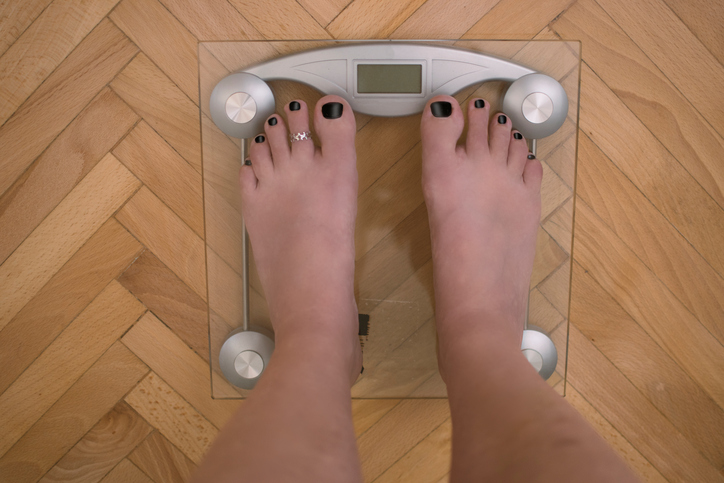The 4 Most Common Reasons You Are Not Losing Weight

Tell me if this scenario sounds familiar. You’re active—you even manage to exercise a few times a week. You’re eating well (at least better than most people you know). Yet, no matter what you do, the pounds seem to stick to you like burs on fur. Not losing weight can be incredibly frustrating. But the good news is you are not alone.
It’s only natural to wonder if your metabolism is “damaged” beyond repair and those darn pounds will never drop off—no matter what you do. Before you decide to throw in the towel, give up on your weight-loss goals for good, and start binge eating comfort foods, there might be a few simple reasons you are not losing weight (along with how to easily address them).
(For what it’s worth, this is precisely the scenario that Tammy Kelty, Grand Prize Winner of the BioTrust 12-Week Shape Up Challenge, found herself in before losing over 30 pounds—more than 16% of her starting weight—and over 7 inches from her waist. To find out how she did it, check out this interview with Tammy featured on the BioTrust Radio podcast.)
Let’s get right to it.
4 Reasons You Are Not Losing Weight
1) You aren’t eating enough (especially protein). When the weight isn’t coming off, all too often, the first reaction is to cut calories, and then cut them some more. This can be a big mistake as the body can start to fight back through a built-in process called “adaptive thermogenesis.” Simply put, your metabolism readily “adapts” (making calorie-preserving adjustments), essentially holding on to those fat stores even more tightly.
In addition, many people who start cutting down on calories inadvertently cut back on one of the most important macronutrients to support metabolism (and this leads to not losing weight): Protein.
See, higher protein diets represent one of the most effective strategies to optimize metabolism, body composition, and appetite control. Perhaps its most powerful effect is to help you maintain and build calorie-burning lean muscle, which can help preserve metabolic rate even when you do reduce calorie count. Ultimately, that equals quality weight loss, which means you lose body fat, not all-important lean muscle. Plus, protein-rich foods have the highest thermogenic burn and can boost metabolism 3 to 6 times more than carbs or fats.
Solution: Incorporate more protein into your nutrition plan. Experts suggest about .55 to .73 grams of protein per pound per day (or around 82 to 110 grams of protein for a 150-pound person). One of the most convenient, efficient, and effective ways to increase your intake of protein is to use a high-quality protein powder supplement. Other high-protein foods include meats, fish, dairy, legumes, spirulina, and hemp seeds.
2) You don’t have enough lean mass (i.e., muscle). As we get older (beginning once we hit 30, actually), metabolism can slow about 2 to 8% every single decade. This leads many to believe that age is the problem for not losing weight. Fortunately, that typically isn’t the case. Rather, the slowed metabolism—and difficulty with weight management—is more often lifestyle- and behavior-related. In other words, it’s the result of reduced physical activity and a decrease in calorie-burning lean muscle, which not ironically is also lost at a rate of about 3 to 8% every decade past the age of 30. See the connection?
Solution: Rather than letting the number on the scale define your weight-loss success, focus on building muscle while losing body fat, which have two prerequisites. First, you need to be making sure you’re eating enough protein (already discussed above). And second, incorporate resistance training into your weekly exercise schedule. This can include body weight exercises like pushups, pull ups, and body weight squats as well as lifting weights. As a result, you’ll enjoy burning extra calories for up to 72 hours after just one workout.
3) You aren’t getting your ZZZs. Lack of sleep is almost epidemic in our society. Only 40% of us get the recommended 7 to 9 hours of sleep per night while the rest of us are trying to get by on a mere 5 to 6 hours (or less). Yet, missing out on a good night’s sleep even occasionally can significantly disrupt your hormones, metabolic rate, and circadian rhythms. Plus, there’s good evidence that when you don’t get enough sleep, you’re also more likely to overeat, make poor food choices, and skip workouts. It’s no wonder researchers have found that people who get less sleep lose less body fat (55% less) and lose MORE calorie-burning lean muscle (60% more) than those who get their ZZZ’s.
Solution: Make getting a restful night’s sleep a priority. Get as much outside light (i.e., sunlight) as you can during daylight hours (this is often overlooked but crucial), turn off the devices an hour before bed, and climb into your personal cool, dark sanctuary early enough to provide you with those 7 to 9 hours of sleep without having to hit snooze once morning comes.
4) You fail to plan. We’ve all heard the saying attributed to Benjamin Franklin, “If you fail to plan, you are planning to fail!” And it certainly rings true. If you’re trying to just “wing it” when it comes to weight loss (or any new behavior or goal), you likely won’t ever truly realize your goals. Sure, you might exercise semi-regularly and eat a bit “better.” But be honest with yourself. Are you really? Are you really doing enough? And more importantly, are you really being consistent? It’s just too easy for dreams and wishes to get sidelined by everyday obstacles, temptations, and distractions (leading to not losing weight).
Solution: Plan to succeed by setting your intentions and focus on your behaviors. Plan your exercise sessions in your calendar. Create accountability and support. Plan and prep your meals in advance. Set your bedtime in advance. For example, set your alarm clock for the time when you want to get ready for bed rather than just when to wake up.
To track how well you’re doing, keep a food journal to ensure you are eating enough protein. One recent study showed that folks who kept up their food journals six days a week lost around 2 TIMES more weight than those who only kept them one day a week or less. As the saying goes, “What gets measured gets done.” And that’s as true with healthy nutrition and exercise as with work productivity!
Losing weight can be challenging. And not losing weight can be incredibly frustrating. Otherwise, we’d all look and feel exactly as we’d like all the time. Yet, we can continue to make improvements. Even little things like upping protein intake, doing more strength training exercise, and ensuring we get enough sleep can help us make big changes over time, especially when we make a plan, stick to it, and focus on making progress.







